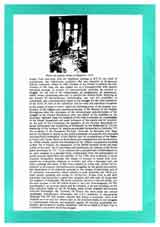THE MYSTERY OF STRUGGLES DEFEATED

Chapter 1:
The Case Of The Individual’s Practical Tolerance For Alienation
Chapter 2:
How Certain Proletarianised Strata Identify With Their Sophisticated Impotence
Chapter 3:
The Mystery Of Petrified Thought Resigned To The Inconsequence Of Pseudo-Revolt
Chapter 4:
The Adventure Of The Will To Re-Invent Daily Life
Chapter 5:
The Adventure Of The Class Struggle Against The Totality Of Alienations
Chapter 6:
The Final Warning
1:
The Case Of The Individuals’ Practical Tolerance For Alienation
Whilst the bookfair throbbed in the background like a hangover, turning his head one way and her stomach the other, the two occassionally cross-wiring into a groan, he wracked her brain to make some intelligent comment about this book and that pamphlet, searching constantly for different ways of contemplating the immediate, forcing himself to turn avoidance of changing anything into various banal reflections. Suddenly someone thrusted a small text into her hands – “The Mystery Of Struggles Defeated”. “Surely this cannot be about me?”, he asked herself. “No no no….this is appalling – I’d certainly never write: “…the bookfair throbbed like a hangover, turning his head one way and her stomach the other, the two occassionally cross-wiring into a groan”. It’s much too derivative. Doesn’t he know that if he wants to get published she really must be original – it really must have some jarring twist and turn of phrase in order to stand out, in order to seduce the reader. If I were to write this I’d… His thoughts rambled on and on as she considered some of the different angles on how to sell his mundane life, on how to turn it into a cultural commodity. Then, as she continued reading the text in his hands, turning from the first chapter to the second, trembling, she realised that he was the subject of this mystery.
2:
As the growing crisis renders liberalism and all other traditional bourgeois ideologies irrelevant, liberal thinkers turn to Bolshevism, appropriating some of the milder elements of its programme. Gradually Bolshevism and liberalism merge. This results in leftism-humanism which has become the ideology of a whole social stratum raised on the spectacle of revolt – that is the cadre. The cadre is the reformist of daily life. He or she takes up Bolshevism’s apparently anti-social attitudes and values, but without the militant posture. Like the Bolshevik, the cadre is paranoid about authority, anti-imperialist, and easily outraged. But unlike the militant who is willing to sacrifice himself for the party, the cadre does everything with an eye toward the preservation of his social position.
The intermediary stratum in the traditional class structure was the petty bourgeoisie who, representing a primitive social system based on local autonomy, longed for the simplicity of an earlier period, but always sided with Power in the end. The transitional figure in the post-World War II universe of the modern spectacle is the cadre. The cadre is the answer to the question: where have all the radicals gone? The cadre is the institutionalisation of the two-sided and contradictory nature of the spectacle, which simultaneously sings its own praise, and, smelling its own stench, reports it. The cadre is not the managerial class, nor the white-collar worker, nor the hip professional. The cadre is anyone willing to perform his or her role in exchange for the miserable compensations which modernity confers. The cadre is the centre of the fabled post-war revolution in the world of the commodity. It is for him that the latest cultural innovations are created. He lives in the new architecture, goes to the modern cinema, pursues the current dream of liberated sexuality. He is the person who acts out eulogies to the commodity society and believes them; who writes pseudo-critiques of the commodity society and believes them; who finds this world unlivable and still manages to flourish in it. The cadre must appear to be in vanguard of his epoch. He must be in favour of everything progressive, everything radical, everything that purports to be new and innovative and stylish. He is the modern consumer, who hates what he must consume because he knows all of its inadequacies and yet who continues to search for the perfect commodity: the one which contains no imperfections. He believes that his educated refusal of inadequate commodities places him above the obedient consumers who believe what they are told. The cadre smiultaneously wants to enjoy the security of submission and the thrill of refusal.
The cadre believes in reform, reform of every aspect of daily life, piece by piece. He believes in reform most of all because, for all his talk about revolution, he is terrified of having to give up the security of this world where he enjoys certain ordinary privileges for a world where he could become anything – a villain, a hero, or simply a mediocre man.
The cadre wants the impossible dream of the spectacle: to consume without working. If he admits that he works, it is only to add that he is doing something he likes to do, which makes him different from everybody else. One measure of the success of the cadre as a role model is the growing sentiment of workers in general to think of themselves as better off than others. Everyone else is unhappy. Westerners think that Eastern Europeans are really miserable. Northern Italians feel sorry for the peasants of the South; factory workers can understand the strikes in the coal mines; alcoholics pity heroin addicts.
The intellectual is the cadre who is most proud that he works, who wants his work to be visible. The intellectual wants the world to know that his activity – the production of ideology – is work, just like making cars. In fact, the intellectual goes one step further: if many workers play down what they do forty hours a week, the intellectual steps forward as the representative of the proletariat. The more silence surrounds the worker and his alienation, the more the intellectual feels obliged to provide meaningful social commentaries. The intellectual is the spectator who can’t bear to simply stand and watch a spectacle with his hands in his pockets. He has to write something down. The intellectual is paid to supply the bourgeoisie with remedies for their sick world. Instead, he manufactures special vocabularies to explain his impotence, posing one hundred times as many questions as he answers. The bourgeoisie know that they will get nothing practical from this modern-day eunuch, but they also know they are not capable of solving the complex problems which overwhelm them. So they continue to subsidise the intellectual, who, if he does nothing else, demonstrates the rewards of thought without consequence.
“Anything…I must say anything.” he thought to himself, his pen hovering over his notebook. “Anything that makes sense. But what makes sense? Hmmm – maybe I should write that down”, he continued, sipping his coffee in the Café Marlene in the Rue De L’Eau.
7 a.m.
The hardly shaven red-eyed waiter absent-mindedlY swished a dirty tea-cloth round a cracked plate as he gazed vacantly into the empty streets.
Jacques hovered again over his notebook . “Maybe I should describe the waiter. No – never mind. Here goes – first thing that comes into my mind.” He began to scribble fast: “A very thin man, he used to pad out his shoulders and wear bullet proof vests. His feet were size six but his shoes size nine. Everywhere he went there was a large empty hall surrounding him and his voice echoed in his ears. Sometimes sitting on a white cloud he would build, destroy and reconstruct intricate puzzles, whilst out of view, below the cloud, towers crumbled, waterfalls froze and rioters were beginning to make love everywhere. Sometimes, walking into a field of flowers and weeds he’d pick a blade of grass, take off his blindfold and look at it at a distan ce of two inches from the tip of his nose. Sometimes he’d put litmus paper into his food and write an occassional short story on the pain of listening to a mans screams. He used to pad out his shoulders and wear bullet proof vests. His feet were size six but his shoes size nine.”
The waiter glanced over to Jacques with an air of repressed bitterness.
Jacques re-read what he’d just written. “No – it’s neither one thing nor the other, and anyway a bit too adolescent. Why don’t I try poetry?” He continued scrawling:
The Ryot
Ryot Ryot burning bright
In the forests of the night:
What commoditys’ hand or eye,
Could frame thy fearful symmetry?
On what street corner or street cries
Burnt the fire of thine eyes?
On what wings dare we aspire?
What lucidity dare sieze the fire?
What the bricks against the chain?
In every furnace was thy brain!
What new world? What clear grasp
Dare its lively tremors clasp?
When the kids returned to watch TV
Diluting life with CND
Did the State smile, its work to see?
Did the powers that make them sheepish make thee?
And what molotov, beyond art,
Could twist the sinews of thy heart?
And when thy heart began to thunder
What dread anger? And what dread plunder?
Ryot Ryot burning bright
In the forests of the night
What other-directed hand or eye
Dare frame thy fearful symmetry?
The waiter moved casually towards Jacques, coming up behind him, a sad yearning occasionally visible beneath his glum face.
“No no…” thought Jacques again, crossing out the poem. “No-one likes a re-write of English Literature – far too sacred terrain. Not even an Englishman would dare try it. Must try something more sober. How about: “What is reality? Anything one chooses to think it is? But what is it that concretely prevents the free will of the individual from realising himself in common with other individuals unmediated by external authority?” No no – that’s getting far too precise – an intellectual like me shouldn’t ask questions like that. The world must be kept at a distance”, he rambled on to himself, crossing out the last sentence and replacing it with: “What is it that’s essentially human that separates man from man and yet brings men together?”. “Essentially human”, he thought to himself again.
The waiter peered over Jacques’ shoulder and began to read.
Jacques continued: “What makes men and women clash together arbitrarily like billiard balls haphazardly ricocheting off each other? What separates men from the world around them?”
The waiters’ sneer grew increasingly bitter.
“Oh Patrice – why does she always have to be so painfully stubborn?”, Jacques thought to himself and continued writing: “How does Power make people turn against themselves, act against their own desires?” He crossed it out. “What’s happening to me?”, he thought. The waiter continued glaring. Jacques, oblivious of the waiter, continued: “Sociality is the necessity of survival, individuality its’ enemy. The waiters’ eyes grew wild with suppressed anger as he read Jacques’ notebook. Jacques thought, “Yes – that’s nice and provocative. My students won’t like it – but it’ll give them something……….Aaaaaaaaagh!!!!!. Jacques slumped to the table.
The waiter returned the knife to his inside pocket, from whence it had come. He picked up his copy of Marx’s Theses On Feuerbach, which he’d been reading earlier. He ambled over to the window, gazing vaguely into the distance, a satisfied smile on his lips.
7.30 a.m. In the distance, the sound of cars being overturned.
5:
“It’s like South Africa working here” – Cowley worker during the wildcat washing- up strike.
“We would like to make it clear to the outside world that we will get whatever we want, and that whatever we want we will get. If possible we will use violence…If possible. Because by sitting around a table and talking about these things with the whites brings no good future to us. It’s just like talking to a stone. Now by violence they will understand a little of what we say – a little. Now by war they will understand everything – by war.” – A young Soweto black guy, quoted in Call It Sleep.
6:
The new revolt excludes almost no one. Of course, some are hopeless cases. For -instance, it’s not possible to show the rulers the extent of their delirium. But it is necessary to take into account the bitterness of certain servants of power who are imprisoned in roles that are stultifying and humiliating. However, indulgence has its limits. If, despite everything, these people persist in putting a guilty conscience and their bitterness in the service of power by creating the conditioning mechanisms that colonise their own lives, and if they choose power because power has already chosen them then too bad.
D.Alec Tixe was born with the Spartacus uprising in B.C.73, the child of A.Lienation, the well-known condition. She was educated at St.Saviours School, Liverpool, where, in 1982, because of his efforts to achieve the destruction of the class she was singled out as a hermaphrodite with distinct historical promise. In pursuit of extra-curricular activities, he decided to struggle for the end of all compromises, all resignations, all separations, which meant attempting each day to practice the critical truth. Studying at the School of Revolutionary Individuality, she met the possibility of community and communication based on the struggle for the total realisation of the point of view of the individual and for what the individual recognises in the points of view of others. After the withering away of the peasant communism of the Diggers and anarcho-mysticism of the Ranters in the English Revolution; after the repression of the revolutionary anti-clericalism of the Enragés in the French Revolution; after the defeat of the Luddites by the dominant capitalist class; the massacre of the Paris Commune by combinations of the liberal bourgeoisie and naive tolerance of the enemy and its property on the part of the Commune; the slaughter of the German Spartakists by Social Democracy; the butchering of Kronstadt by the Bolsheviks in ’21; the disarming of the workers by anarcho-syndicalist bureaucrats in Catalonia ’37; the smashing of the Hungarian Workers’ Councils by Kruschev and Nagy and by the failure to appeal to the world proletariat for support; the repression and superficial ‘integration’ of the Detroit riots by combinations of the National Guard and Tamla Motown Rock Music; the manipulation and recuperation by Leftist unions, parties and ideologies of the wildcat occupations movement in May ’68 in France; the resignation of the British workers’ sit-ins and mass strikes of the early 70s to Labourism and parliament; the failures of the Portuguese movement of ’74-’75 to confront the contradictions of dependance on an army existing as a separate force, independant from the development of armed popular assemblies; the inability of the 1981 riots in Britain to incite practical recognition amongst the masses of workers to attack their domination by commodity relations as workers; and after a thousand and one other uprisings like these, D.Alec Tixe realised he could only achieve the resolution of all present contradictions by struggling for the global and irreversable destruction of all authority external to the masses of individuals, and of all colonised consciousness which submits to such authority and which prevents people speaking and acting for themselves. D.Alec Tixe is still alive every time that hierarchy is called into question and will only die along with the massacre of humanity. His secret notoriety has yet to become public, but the best account of his life will be found in her own “Autobiography Of The Anti-Readers”, an account which will be revealed, if we are victorious, in the final historical battle of All or Nothing, when all her qualities will become common knowledge. His ‘Comedy of Errors’ has been made into several ‘Keeping ‘Em Off The Streets’ Awards. Her future is uncertain – since it all depends on your and my choices and on the pracical results of our struggles to communicate without, and explicitly against, all external constraints, mediations and models of ‘correct’ behaviour. The life or death of D.Alec Tixe is completely inseparable from this struggle.
Samotnaf Note:
Chapters 2 and 6 come from the situationist-influenced video “Call It Sleep” by Isaac Cronin and Terrel Seltzer.


Leave a Reply